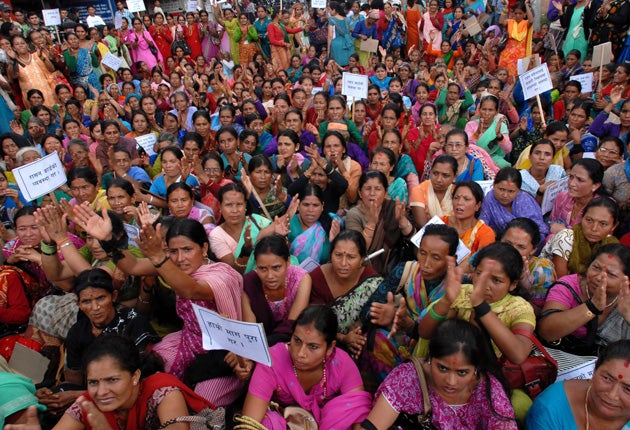Men offered £400 to marry Nepal's widows
Hundreds of women march through Kathmandu over 'humiliating' scheme

Women protesters have marched through the streets of Kathmandu in their hundreds after the government announced a "humiliating" scheme to offer financial incentives for men to marry widows.
The scheme has been deemed necessary by the government of Nepal in part because of the 10-year-long civil war that claimed up to 13,000 lives and widowed many women. Such women are widely ostracised and discriminated against in the conservative country. In such circumstances, the government said that by offering grants of 50,000 Nepali rupees (£395), unmarried men would be persuaded to wed widows to help re-integrate them into society.
But campaigners say the scheme would not only turn women into cash cows but would be open to abuse by human traffickers. They warn that in Nepal women are traded for as little as 5,000 rupees. Lily Thapa, founder of the group Women for Human Rights (WHR) and one of the organisers of the rally, said: "It's totally humiliating for the women. We do not want this. It's against our human rights."
Ms Thapa set up WHR after her husband was killed while serving with UN peacekeeping forces in 1991. She said widows in Nepal were routinely discriminated against, particularly in rural areas, and were prevented from wearing colourful clothes or attending important events as they were considered bad luck. "In the West you have no idea of the cultural code that goes on here. If women want to wear a colourful dress that is their right."
She said the government's proposal would not help the situation and would be open to abuse by traffickers.
The opposition Maoist political party has opposed the offer on similar grounds. Campaigners say the cash payments may encourage men to marry a widow only to abandon her once they had received the money. They say the government would do better to spend the money on projects to help educate and empower women in Nepal. Some say the money should be paid directly to the widows without any demand that they marry.
Yesterday, several hundred women marched through the country's capital waving banners that read: "We don't want government dowries" and: "Don't put a price on your mother". Women came from across the country, some complaining the proposed grants had made their lives harder as men were treating them differently.
Jayanti, 25, from Nepalgunj told the MyRepublica news website: "There are many of us who are young and want to remarry but our main concerns are our children," she said. "This one-time provision is not enough to raise our children and provide them with proper education. Moreover, there is no guarantee that we will even get to use the money."
Nepal's civil war pitched Maoist guerrillas against government forces, and they created a generation of struggling widows in an already impoverished country. The war ended in late 2006 after the Maoists agreed to re-enter the political mainstream as part of a peace deal which saw the country become a republic. Last year's elections handed power to the Maoists but they stood down from the government in May after a row over the integration of former guerrillas into the national army. The Maoists remain outside the government, and the country has suffered considerable political turmoil and uncertainty.
Join our commenting forum
Join thought-provoking conversations, follow other Independent readers and see their replies
Comments
Bookmark popover
Removed from bookmarks